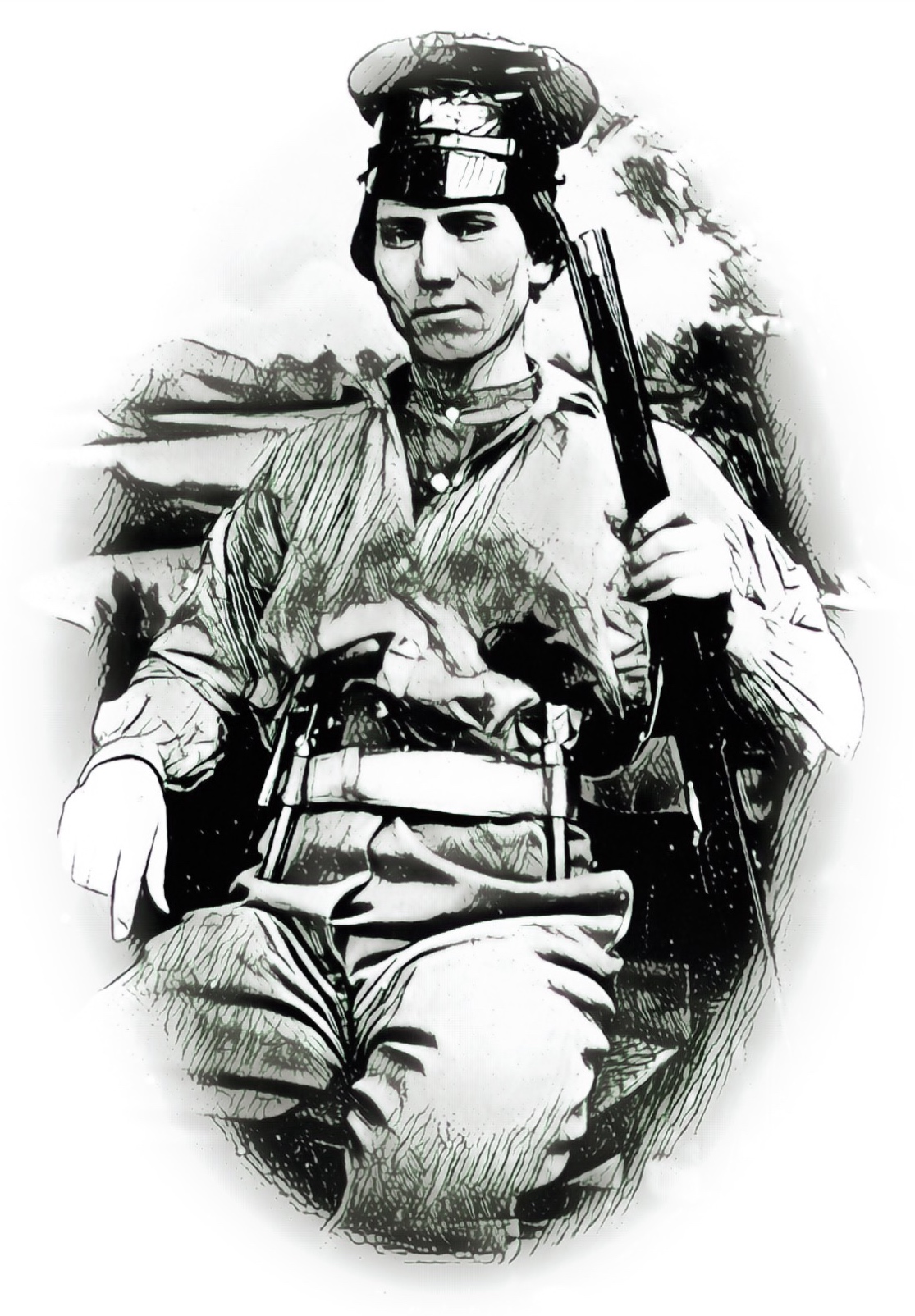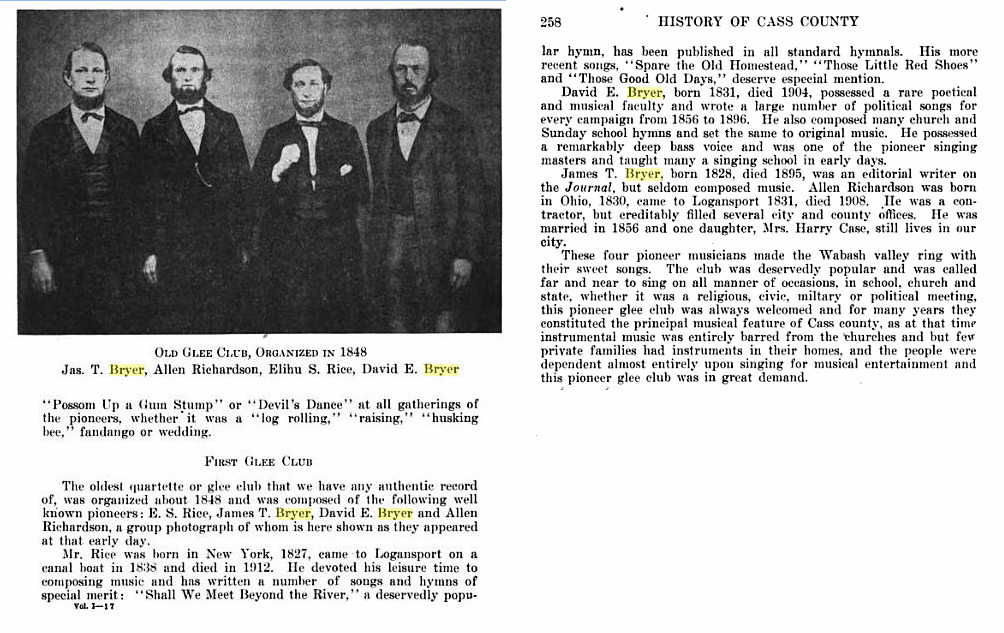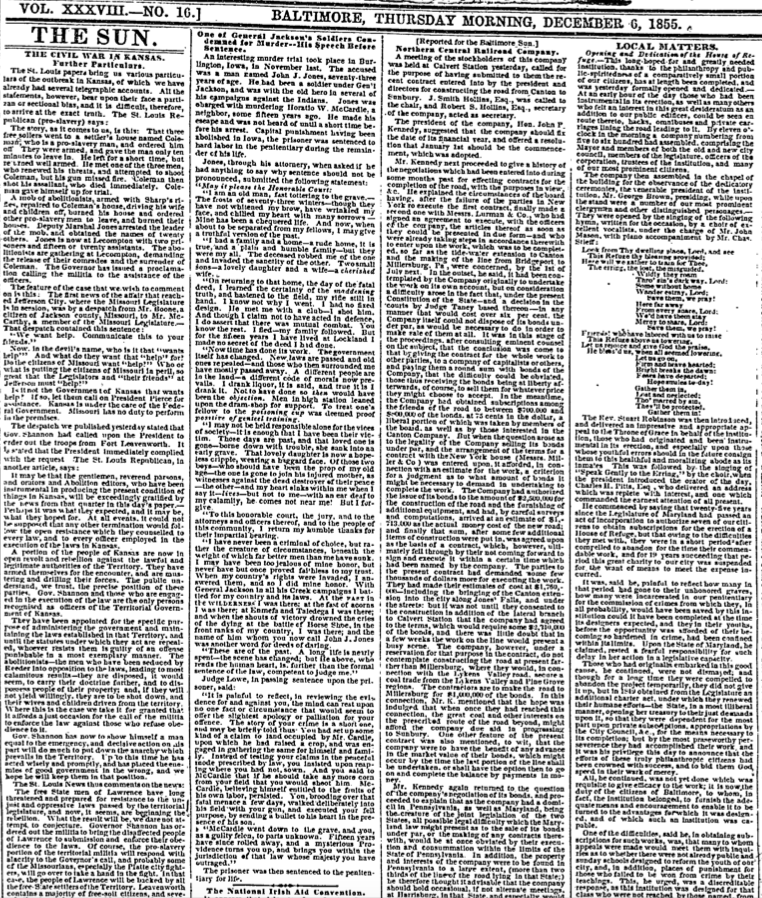These letters pertain to Pvt. Isaac Watkins Barker (1841-1862) of Co. D, 23rd Ohio Volunteer Infantry (OVI) who was killed in action during the Battle of South Mountain on 14 September 1862. Isaac was the only son of Thomas Fuller Barker (1804-1892) and his first wife Clarissa Watkins (1805-1854) of Blandford, Hampden county, Massachusetts. Isaac’s siblings included Martha Watkins (Barker) Horr (1834-1872), Helen B. Barker (183?-1887), Lizzie F. (Barker) Wright (183?-19xx), Vesta J. (Barker) Freeman (1836-1929), and Julia A (Barker) Warfield (1838-1922).
[Note: These letters are from the collection of Richard Weiner and are published by express consent.]

A scene of the fighting at South Mountain from the cover of John David Hoptak’s book.
TRANSCRIPTION LETTER ONE
This letter was written by George E. Blakelee (1836-1909) who later became a physician and a newspaper editor. He was eight years the editor of the state agricultural paper—the Ohio Farmer—before moving to Chicago and earning a degree in homeopathic medicine. He was subsequently the editor of the New York Tribune, the Farmer’s Home Journal, and the Weekly Novelist. He practiced medicine in New York for 16 years.
George was the son of Philemon Blakelee (1809-1853) and his wife Amanda (1812-1895). I have not yet verified it, but my hunch is that Amanda Isaac’s Aunt—either the sister of his mother or father. Census records indicate she was born in Massachusetts.
In 1860, at the age of 24, George resided in Huntington, Lorain county, Ohio, where he earned a living as a “carriage maker.” Residing in the same household and assisting him in the business was 18 year-old Isaac W. Barker.
Huntington [Lorain county, Ohio]
October 8th 1862
Dear Father & Friends,
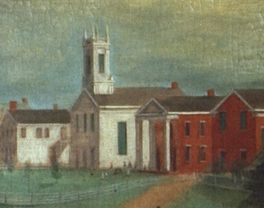
The Congregational Church in Wellington, painted by Archibald Willard in 1857
Sunday the 5th was a beautiful day. At one o’clock P. M. the people of all the churches and a great many that seldom if ever are seen at church convened at the Congregational Church to attend the funeral of our beloved Isaac. After the singing of an appropriate hymn and a prayer, [Rev.] Mr. [Ansel Russell] Clark took his text, Proverbs 14-37 and preached one of his best productions prepared expressly for the occasion. I furnished him with many extracts from Isaac’s letters which he used to good advantage. At the close of the sermon, a large choir arose and sang the hymn “Enon” in the Jubilee on the 266 page. The words are as follows.
“Go to the grave in all thy glorious prime, In full activity of zeal and power; A Christian cannot die before his time, The Lords appointment in the servant’s hour. Go to the grave; at noon from labor cease; Rest on thy sheaves, thy harvest work is done; Come from the heat of battle, and in peace, Soldier, go home; with thee the fight is won. Go to the grave, for there thy Savior lay In death’s embraces, ere He rose on high; And all the ransom’d, by that narrow way, Pass to eternity life beyond the sky.” [Author: James Montgomery]
There is not room on this sheet to write the hymn in verse order, but it is punctuated right. I selected the piece. The church would not hold the people that assembled. James & E., Ralph [Horr] & M[artha], Uncle A’s family, Mary & myself were the mourners.
Since writing before, I have received some verses composed by one of Isaac’s mates on his death. I will send a copy. Also some composed by Mother. James received a letter from Capt. [Howard S.] Lovejoy saying that Isaac was buried on Monday the 15th alone and a headboard put up at his grave with his name, company, and regiment on it. Also Capt. Lovejoy has sent the papers to Washington that are necessary for you to draw pay and the bounty, by your applying.
The draft came off in Ohio October 1st. Huntington had her full quota, so none were drafted from here. Wellington had 19 drafted. No one was drafted that you know. Lagrange had 13 drafted and Ralph [Horr] ¹ was one. They have broken up house keeping. [His wife] Martha is coming to Huntington to live and Ralph goes to camp this week.
We are all well and doing well. Crops are very good. I have 4 acres of corn, ½ acre of potatoes, have thrashed 24 bushels of wheat and 125 bushels of oats, fruit very plenty. My health is good. I have all that I can do in the [wagon-making] shop.
Yours as ever, — George E. Blakely
¹ Ralph Turner Horr (1835-1882) was the son of Roswell Horr (1796-1841) and Caroline Turner (1805-1894). He was married to Martha Watkins Barker (1834-1872). Ralph was a harness maker by trade.

Page 1

Page 2

Page 3

Page 4
TRANSCRIPTION LETTER TWO
This letter was also written by George E. Blakeslee and was most likely sent at the same time as the one datelined from Huntington on 8 October 1862.
No. 2
As to Isaac’s affairs, when he enlisted, he wished me to receive his wages and use them to settle up his affairs, debts &c., which I did. He also wished me to keep all his money after settling affairs in a bunch to use it as I thought best. I have invested his money in sheep and steers. The account is as follows:
Cash sent first time — $25.50
Paid for boots & Stamps — $6.50
Cash sent second time — $20.00
Paid James (April 1862) on debt — $10.00
Cash sent third time — $45.00
Paid for boots — $5.50
Paid (July 1) for postage stamps — $0.50
Received note against me — $9.00
[ ] balance on account — $2.00
[Balance] $101.50
Taking expenditures from the receipts $101.50 – $22.50, it leaves due Isaac $79.00
Now this money belongs to you. I have got it invested so that I cannot get it out without sacrifice until April or June, just which you may choose. I shall have two hundred worth of steers to sell in April(this is the time that drovers flock in for 2 year-old). I will agree to send you the $79.00 by the first day of May next if that will do you. All the money received has passed through James’ hands. I will get a certificate showing the account is correct. Isaac lent me the money without interest if I would settle up his affairs. I have done so, There is a note with me against Bennitt & Fields of $20.00 which I will collect if you order it and send the money directly to you, and also I will send some on any one account if I succeed well in collecting where it is due me.
Isaac’s trunk is here containing his clothes &c. What will you have done with it? It contains one pair of black pants, silk vest, black coat, 2 pair of boots & shoes &c. &c. Write all about it & oblige.
“They have laid him away” — written on the death of Isaac Barker by G. G. Field in camp.
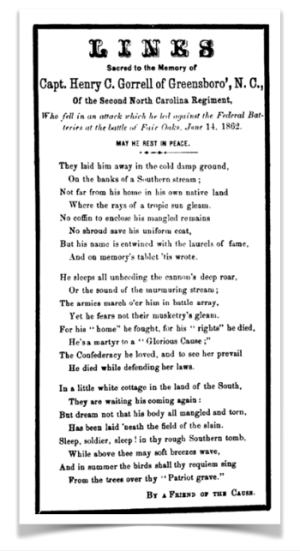
G. G. Field’s poem was actually an adaptation of one that was written anonymously as a tribute to Confederate Capt. Henry Clay Gorrell of the 2nd North Carolina Infantry who died at the Battle of Fair Oaks in June 1862. It was published widely and became a folk ballad under the title, “May he rest in Peace.”
They have laid him away in the cold damp ground
On the banks of a southern stream,
Afar from his home in a stranger’s land
Where the ray of a southern sun gleams.
No coffin enclosed his mangled remains
No shroud save his uniform coat,
But his name is sustained in the laurels of fame
And on memory’s pedestal is wrote.
He sleeps all unheeding the cannons deep roar
As the song of the murmuring stream
The armies march o’er him in battle array
Yet he heeds not the musketry’s gleam.
For his country he fought, for his country he died
A martyr to liberty’s cause;
Fair freedom he loved & to see her prevail
He died while defending her laws.
In a little white cottage in the land of the North
They are waiting his coming again;
But they dream not his body all mangled and torn
Has been laid ‘neath the field of the slain.
Sleep, soldier sleep! in thy rough southern tomb
While above thee the soft breezes wave,
In the summer the birds they requiem sing
From the trees o’er thy patriot grave.
Now write me a large letter. Tell me how you want Isaac’s matters fixed &c. Give our love to all. Tell Dwight that his cupboard stands in the shop where he left it but have found no chance to get what it is worth. I will continue to try & send the pay as soon as sold. Yours as ever, — George E. Blakelee

Page 1

Page 2

Page 3

Page 4
TRANSCRIPTION LETTER THREE
This letter was presumably written by George E. Blakelee’s wife.
Huntington
February 1, 1863
Dear Sister [Julia] and Brother,
I delayed writing to you on account of seeing Capt. [Howard S.] Lovejoy. He came here on furlough but I did not see him. I suppose E. wrote Pa all that Capt. Lovejoy said about Isaac. He speaks very highly of Isaac. He was a brave soldier. He was most too daring—too venturesome. That was the greatest fault with him. He was so elated with the idea of going into battle that he did not think of danger. He was anxious to do something for his country and he did. He died for his country. We ought not to wish him back for I believe he is happy but oh! I can’t help to murmur. The loss of such a good brother is so much. I wish I could feel more reconciled.
The boys in the 23rd are coming home on furlough now and when I see the boys coming home—all but Isaac—it brings such ugly, wicked thoughts in my mind. And some of the boys get wounded and come home. I wonder why it would not have been Isaac. This is wrong and I try to banish such thoughts.
How is Vesta? I hope she is getting along well. Is her babe well? The little darling, I wish I could see it. What are they going to call it. I wish she would call it Francis. Julia, you did not answer my question, where do Edwin [Freeman] and Vesta live?
I received a letter from [sister] Martha [Horr] last week. She wrote she does not hear from home only when I send my letters to her. Now why isn’t that some of you can’t write to her? Helen I should think might write to her as many presents as she has had from her. Martha feels bad and slighted. She would love dearly to hear from Pa. Julia, you inquired where Aurelia is. She is teaching in Brighton—gets 14 dollars a month. She boarded with me last fall and attended school. Libby is at home and health is quite poor. She has something growing in her nose. She has been to Cleveland to have it operated upon.
We have had a very open winter. It has been nothing but mud and slosh all winter. I can’t go anywhere—not even to my nearest neighbors. I can’t visit the girls because I can’t get there. For my part, I am heartily sick of Ohio. The old settlers say they never saw such a winter.
Julia, I saw in the Springfield paper the death of Eli Shepard—also of Marble Shepard. How is Mas Shepard’s health? Does Lucy live with her? Has she any children? Julia, next time you write, tell me all the news—girls who are married and who is not, and who has died. I feel very sorry for Mrs. Kyle. Give my love to her. Is Lucas tending upon her yet? What is Helen doing this winter? Is she attending school? Tell her to improve her time so she can teach. Isaac was so anxious to have Helen get education to teach. Cousin Libby Barker expects to teach next summer. James’ folks were well the last I heard.
Julia, little Mari is the prettiest child I ever saw—such an amiable disposition. I never knew her to show any spond[?] yet. I tell E. she is too good for this world. She says everybody tells her she won’t raise her. I suppose [ ] commences keeping house this week. George is very hearty and tough this winter. He has kept a hired man in the shop ever since last September. They have all they can do and work early and late. There are four other wagon makers in town. They have nothing to do. I don’t know why it is.
My health is not very good. We have had a bad winter for invalids. I think I shall go to Wisconsin next summer for my health. George says if I run down as I did last Spring, I must go. I have Isaac’s likeness—a first rate one. When I go to Oberlin, I am going to have a large photograph taken and put in a frame. I must close so goodbye. Give my love to all, Motherm and the little ones.
P. S. Ask Pa if there is a man living in Blandford by the name of Louis Davis and what kind of folks are they.

Page 1

Page 2

Page 3

Page 4
TRANSCRIPTION LETTER FOUR
The following two letters were written by George Newell Burdick (1841-1874), the son of George L. Burdick (1808-1866) and his first wife, Harriet Bowers (1804-1843) of North Blandford, Hampden county, Massachusetts. George took Catherine Bates (1817-1856), the widow of Eli B. Warfield (1810-1840) as his second wife. Eli and Catherine’s son, Dwight Eli Warfield (1837-1912) is mentioned in the letter. Dwight was married in 1856 to Isaac’s sister, Julia A. Barker (1838-1922).
Blandford [Massachusetts]
October 19th 1860
Friend Isaac,
I received your letter a week ago today with much pleasure as I always do your letters. We had a cattle show here in Blandford about two weeks ago and a very good one for this town, I think. I wish you had been here. I think you would have enjoyed it very much indeed. I think Francis had better go to school. I should advise him to study the spelling book a little more though. I have had a letter from him since he went to Westfield to school. I supposed that he was a better scholar until I had a letter from him.
I think your chance is good for Lizzie Hall yet. You had better come out and try it and see. We have a singing school tonight. I wish you was here to go with me. We used to have some good times singing school nights and I hope we shall have some more but we cannot tell as to that. We know not how soon we may die, but if we do not meet on this earth again, I hope and trust we shall meet in a happier world than this.
I am glad you live so nigh church. I should consider that a great privilege though we are not so far off as some in town.
Dwight [Warfield] is here and he says he will carry this letter for nothing so I guess I will send it by him and save three cents. I do not believe you can read it when you get it for it is about equal to Francis’ writing. My hands are so stiff, I cannot hold on to the penholder.
We have got our fall work almost done. Then I am a going visiting some, I’ll bet you. I wish you was here to go with me. I think we should enjoy it very much.
Sylvia Siger is married to a man from Becket [named Simeon Cooper]. I guess there is not any more news. Give my love to Julia and Sis and accept a share yourself. Cornelia says she cannot write this time. Write soon. From your old friend, — Newell G. Burdick

Page 1

Page 2

Page 3

Envelope
TRANSCRIPTION LETTER FIVE
Blandford [Massachusetts]
January 22, 1861
Friend Isaac,
I almost feel ashamed to answer your letter, it has been so long, but I don’t have much time; I have so much to attend to. We have Lyceums to he Centre now. I have had to speak once. The question was, “Resolved, that the secession of South Carolina is beneficial to the Union.” I was on the negative and got the question. D. Shurtleff spoke with me. He is smart.
I am not very well now. I have got a sore throat so I did not go to school today. We have got lots of snow here. We are having cold weather now. It was very cold and windy yesterday. The snow blew so we could not see but a little ways.
Since I received your letter, one of my friends has departed this life. It was Martha [F.] Hatch. She was buried a week ago tomorrow. She had the inflammatory rheumatism. It struck to her heart and she could not live then. She was a good girl. She had her ways but I liked her. I waited on her all of last winter and until after the 4th of July. I have spent many happy hours with her. Her people feel very bad indeed but we have all got to part with friends that are near and dear to us. But if they are only prepared, we feel very much different about it. She had a great many friends and she will be missed very much.
Franklin [Clinton] Knox and Lucy Ann Cartter are made one. Jane Lewis has got a son by Frank Knox. She is very sick with fever. They do not think she will get well.
Ursula [Maria] Herrick was married New Years to a man from Springfield [named Emory Cutler Hawes]. He is a widower with two children and a butcher. He used to be in company with Mr. Chaffee. Mr. Chaffee made the match, I understand. Asahel W. is teaching school in Thorndike this winter. Henry Blair is at home now. I do not know how he feels about his misfortune. I do not think he could have thought much of her. It is a good thing for her, I guess, for she is not very healthy and he wants someone that can work, you know. I do not know who he will get now, I am sure.
Give my love to Dwight’s people and tell them to write to me. Tell them we are as well as usual. I am glad they like the West so well but should like to have them here. Write soon. So not wait as long as I have. Yours as ever, — Newell G. Burdick

Page 1

Page 2

Page 3

Envelope














































 These letters were written by 58 year-old Temple Franklin Cooper (1805-1864) who served as captain of Co. K, 52nd Georgia Volunteer Infantry. Temple entered the Confederate service in early March 1862 and was captured at Champion’s Hill, Mississippi, on 16 May 1863. He died of erysipelas at
These letters were written by 58 year-old Temple Franklin Cooper (1805-1864) who served as captain of Co. K, 52nd Georgia Volunteer Infantry. Temple entered the Confederate service in early March 1862 and was captured at Champion’s Hill, Mississippi, on 16 May 1863. He died of erysipelas at 





